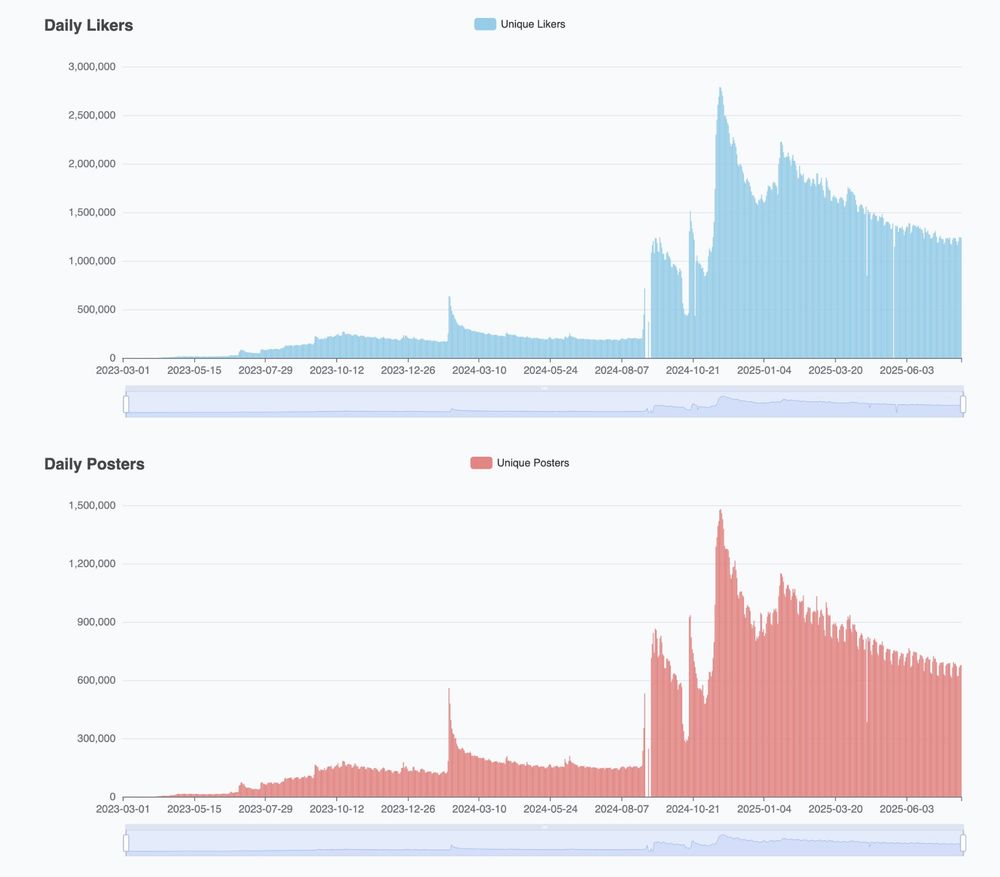
Interesting how much Bluesky usage has fallen - it is now about half of what it was in November 2024 - would be intrigued to know people's theories about why that is
31.07.2025 16:50 — 👍 1 🔁 0 💬 0 📌 0@edhodgsoned.bsky.social
Associate Director, Polling and Analysis, at More in Common

Interesting how much Bluesky usage has fallen - it is now about half of what it was in November 2024 - would be intrigued to know people's theories about why that is
31.07.2025 16:50 — 👍 1 🔁 0 💬 0 📌 0Fascinated by this way of measuring a Prime Minister's popularity...
By the same measure, here's the number of babies given the first name of our PMs one year into office:
Keir: 0
Rishi: 37
Liz: 24
Boris: 43
Theresa: 20
David: 1,163
Gordon: 14
Tony: 135
Source: ONS
The report - including segment names - is all our own. The aim of the segmentation is to be as descriptive as possible so that others may use it to help better understand society -as such we would not put normative words in those titles.
14.07.2025 10:49 — 👍 0 🔁 0 💬 1 📌 0Nws! our tables page can be a bit of a maze sometimes
14.07.2025 10:37 — 👍 0 🔁 0 💬 0 📌 0Dissenting Disruptors, Rooted Patriots and Traditional Conservatives all score highly on authority measures from Stenner et al. The thing that distinguishes DDs is high need for chaos (Arceneaux et al. 2023 etc.) and desire to tear existing institutions down - hence 'disruptors'.
14.07.2025 10:37 — 👍 2 🔁 0 💬 1 📌 0Wrt to randomising response positions - we do that on any question where it makes sense to do so. But for ordinal scales we tend not to randomise as we want people to see the scale in order.
14.07.2025 10:30 — 👍 0 🔁 0 💬 1 📌 0
On the website here! www.moreincommon.org.uk/our-work/pol... In the July folder as we released alongside all the polling for the report which came out in July
14.07.2025 10:29 — 👍 3 🔁 0 💬 1 📌 1Yeh we debated how we should phrase this for a while - was reassured by the responses though: just one or two percent of voters for each party said they would vote against their own party so I do think it worked
25.06.2025 16:46 — 👍 2 🔁 0 💬 1 📌 0This has interesting implications for how people might vote tactically in a General Election - suggests to me that a 'stop Reform' strategy from Labour could only go so far: Tory voters in particular are much more anti-Labour than they are anti-Reform for example
25.06.2025 16:18 — 👍 5 🔁 2 💬 1 📌 0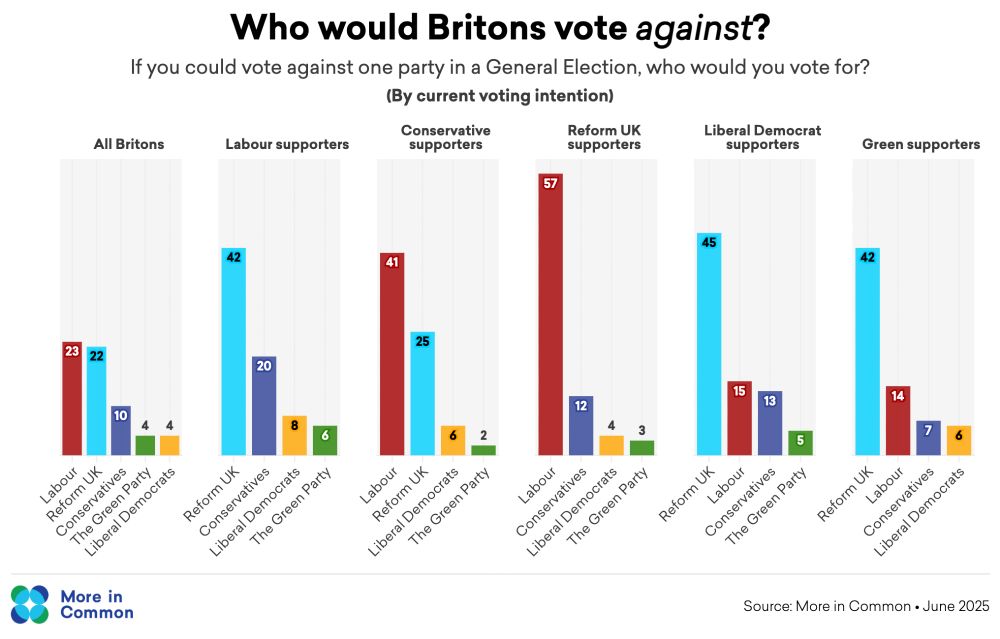
Every week we ask who Britons would vote for - this week we asked who they'd vote *against*
Here's what a negative voting intention looks like:
🌹Lab 23%
➡️ Ref: 22%
🌳 Con: 10%
🌏 Green: 4%
🐦 LD: 4%

Plenty more on this in a short blog I wrote here: moreincommon.org.uk/latest-insig...
And tomorrow morning @luketryl.bsky.social will be giving a webinar sharing these new climate polling findings and others - sign up at the bottom of that webpage!
To build trust in the climate transition, energy firms & policymakers must show they’re acting in the interests of consumers—yes, by lowering bills, but also by showing how climate policies are already cutting emissions, not just boosting shareholder profits.
23.06.2025 13:55 — 👍 3 🔁 0 💬 1 📌 0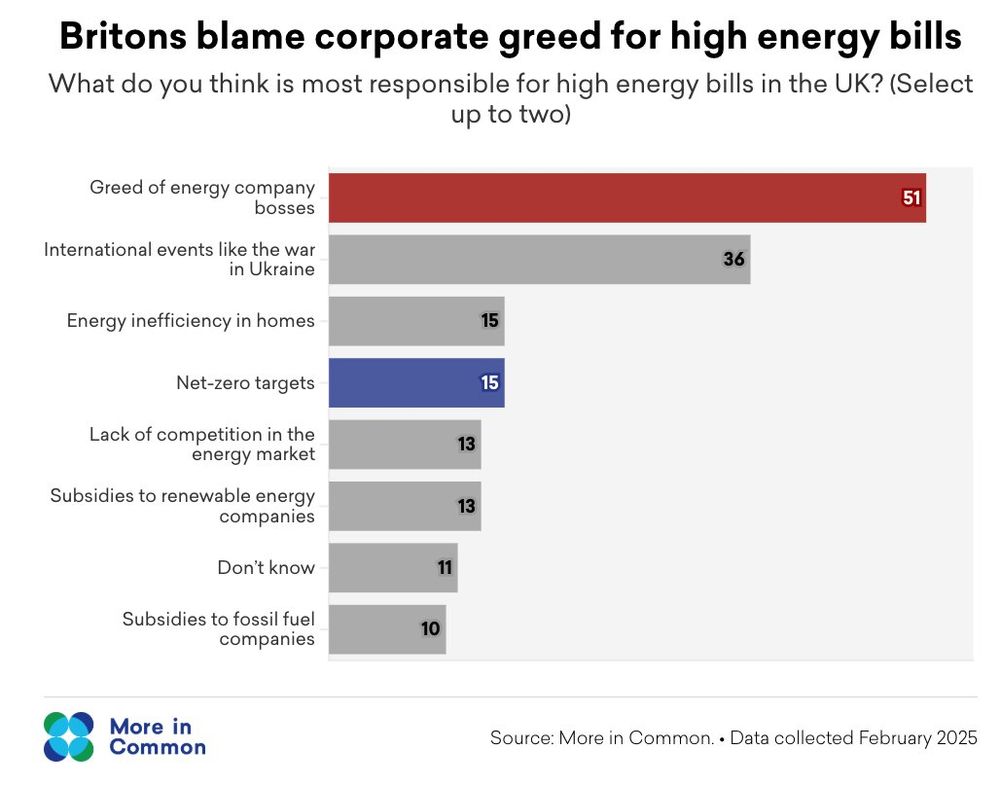
(In fact, if you ask people where their high bills come from, most say the greed of energy company bosses, just 15% say net zero policies)
23.06.2025 13:55 — 👍 5 🔁 0 💬 1 📌 0This is not a sign of backlash against climate policies generally, but comes from a growing sense that energy companies don't act in the public's interest or have their customers at heart - regardless of whether their energy comes from renewables or fossil fuels
23.06.2025 13:55 — 👍 6 🔁 0 💬 1 📌 0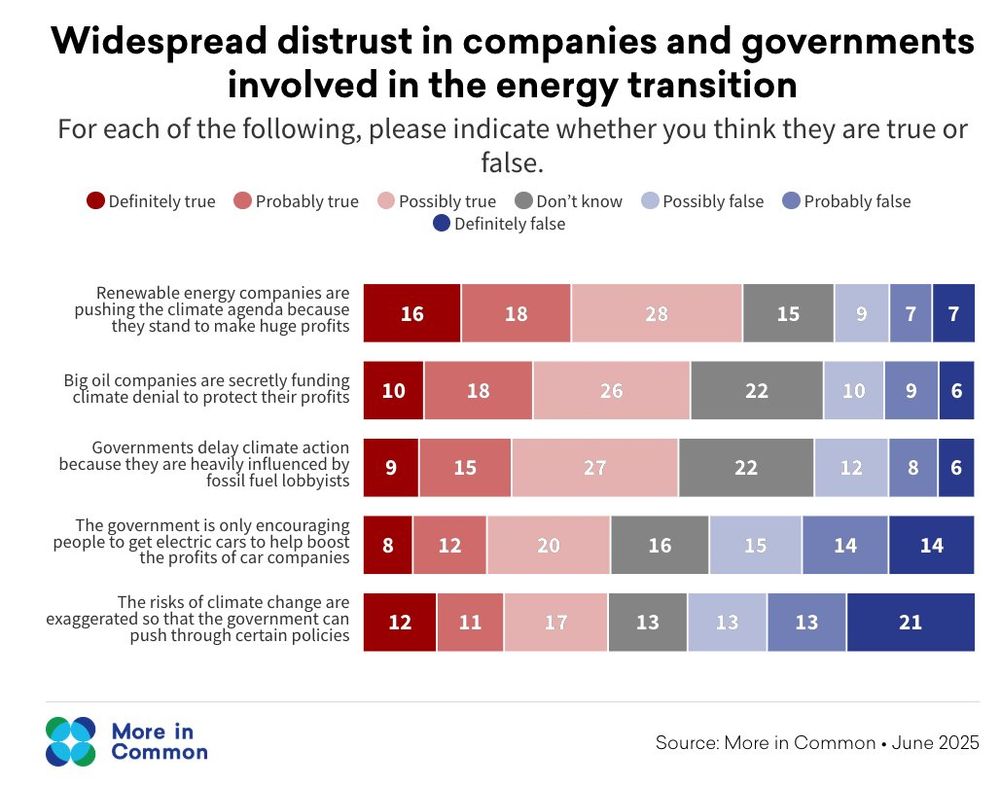
For example, just as a majority suspect that oil companies might be funding climate denial to protect their profits, a majority now also think it's possible that renewable policies are pushing climate policies to support their bottom-line too
23.06.2025 13:55 — 👍 4 🔁 0 💬 1 📌 0
More broadly, this lack of awareness of climate progress reinforces the sense that energy companies aren't acting in the public's interest - and creates fertile ground for conspiracy thinking about energy companies...
23.06.2025 13:55 — 👍 6 🔁 1 💬 1 📌 0This creates big problems for those making the case for the energy transition, because would be much easier to convince sceptical voters about the opportunity of building on successes, than it would be to convince them we need to entirely build to net zero from scratch
23.06.2025 13:55 — 👍 8 🔁 0 💬 1 📌 0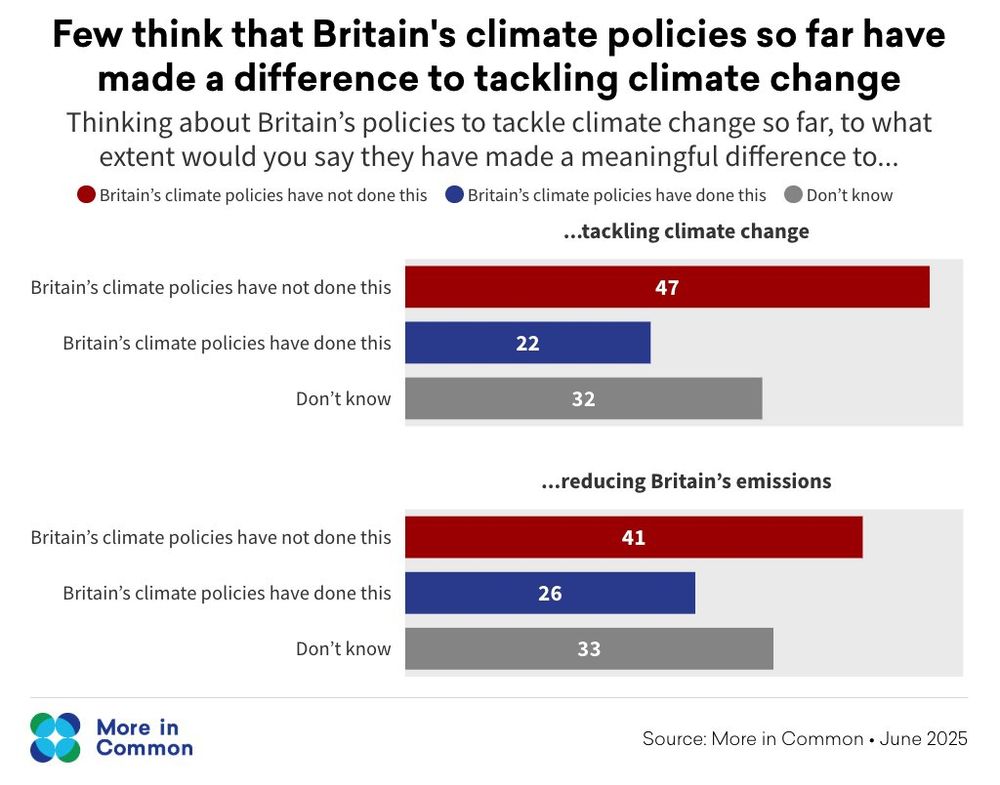
Something really striking about the energy transition in the UK is that, despite having halved our emissions since 1990, very few people are aware of this success - only a quarter of the public think we've made a meaningful difference to cutting our emissions
23.06.2025 13:55 — 👍 117 🔁 45 💬 8 📌 8Great blog from Rory about where AI rhetoric and policy might reinforce a sense that the government isn't focusing on the issues that people care about
23.06.2025 13:51 — 👍 2 🔁 1 💬 0 📌 0this was from an N = 13,000 poll! So pretty good subsamples at each level
17.06.2025 12:40 — 👍 1 🔁 0 💬 0 📌 0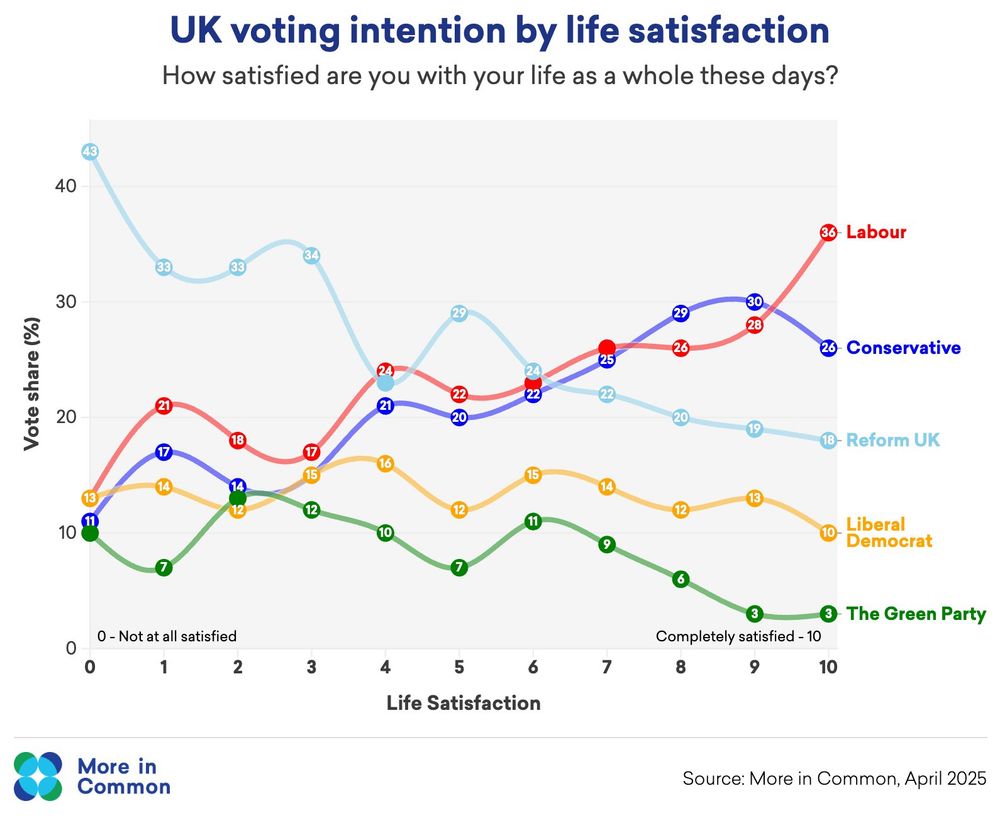
Really strong connection between life satisfaction and voting intention - people with low life satisfaction are much more likely to take a risk on a smaller or newer party, Labour is only comfortably ahead on people who give their life satisfaction at 10/10
09.06.2025 18:31 — 👍 19 🔁 7 💬 3 📌 2Agree - and also a good chunk of Green voters are not the hyper-engaged / ideological stereotype. Many are politically disengaged and just have a strong preference against the Tories and Lab. The sort who vote green as a "none of the above" option rather than strong support for green policies.
08.06.2025 15:49 — 👍 0 🔁 0 💬 0 📌 0Thank you!
31.05.2025 16:14 — 👍 0 🔁 0 💬 0 📌 0and all evidence points to the fact that, were an election held today at least, these non-voter to Reform switchers are real group, are likely to vote, and ought to be taken seriously
31.05.2025 13:35 — 👍 0 🔁 0 💬 0 📌 0So this group are definitely habitual voters rather than reliable voters (for example 47% of them say they tend not to vote in Local Elections, compared to just 7% of all other Reform voters), but that doesn't mean they never vote...
31.05.2025 13:35 — 👍 2 🔁 0 💬 1 📌 0The other factor that makes us more confident that these likely Reform voters would turn out in an election is that many of them have done so before - in 2019 37% of Reform's 2024 nonvoters also did not vote, but 45% of them say they voted for Boris Johnson's Conservatives.
31.05.2025 13:35 — 👍 1 🔁 0 💬 1 📌 0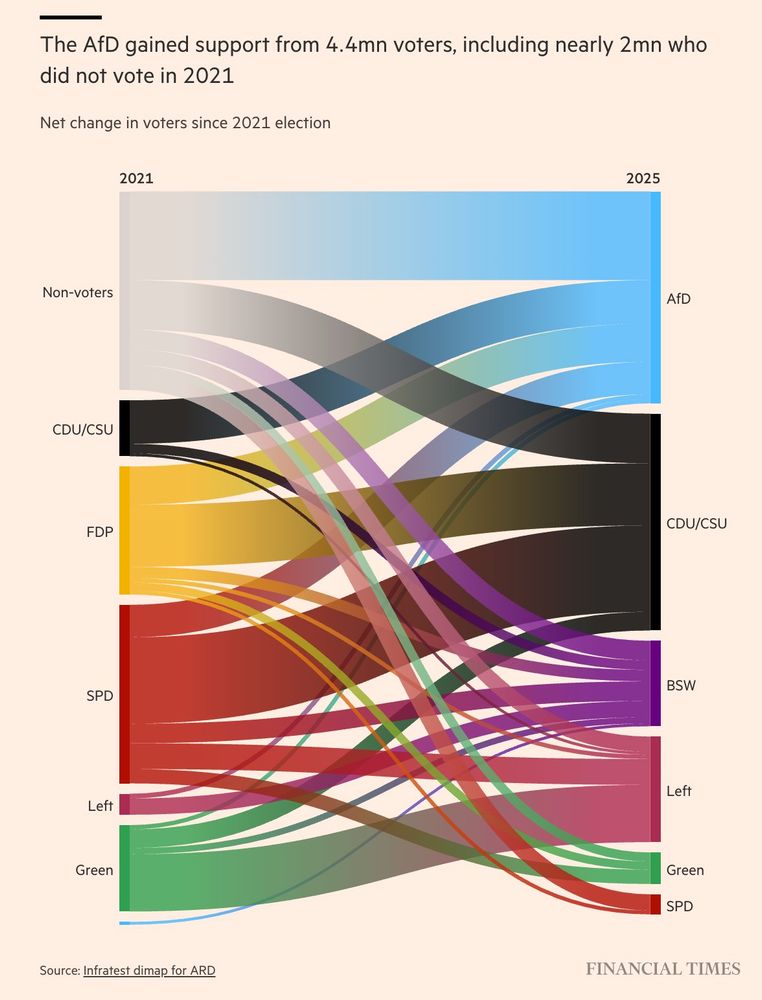
Similarly, recent performance of populist-right parties have been driven by attracting non habitual voters - see e.g. the AfD in Germany who won 2 million votes from nonvoters this year, or Trump who did particularly well with bringing non-voters to the ballot box.
31.05.2025 13:35 — 👍 1 🔁 1 💬 1 📌 0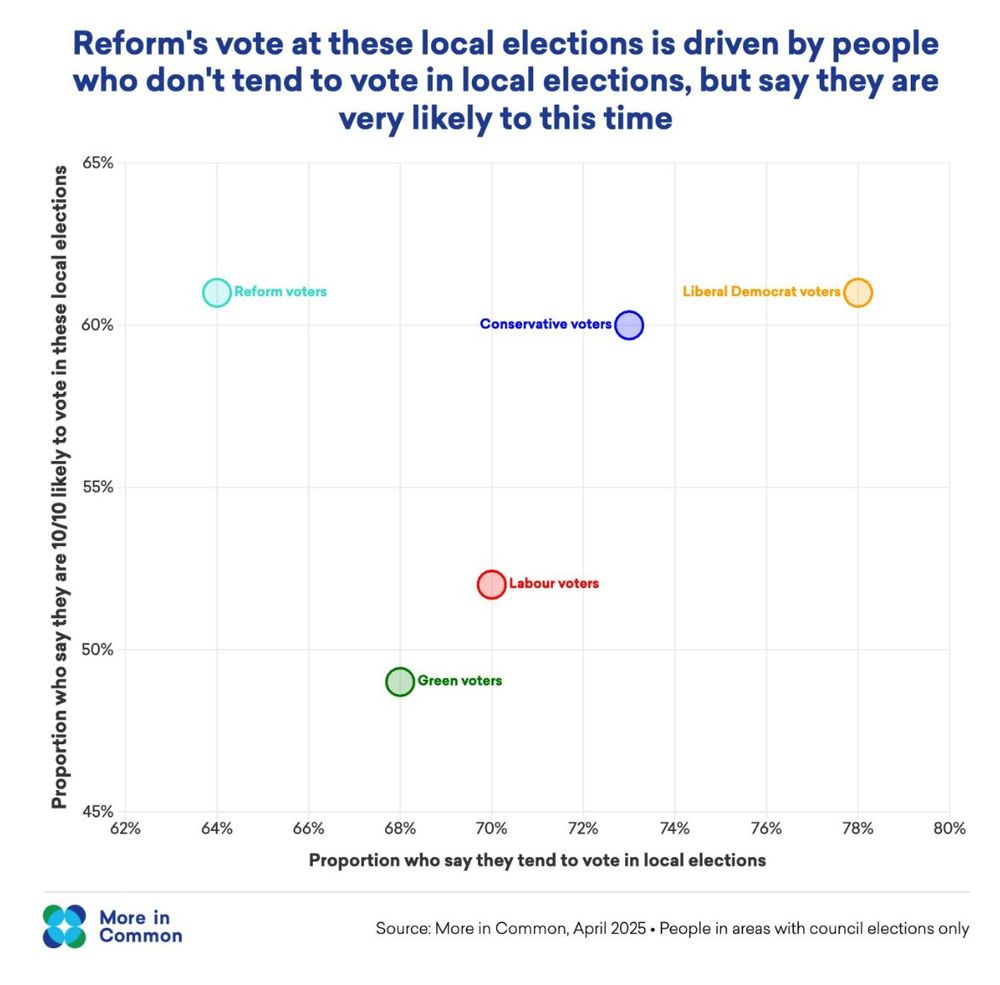
Still, you can't necessarily take people’s word for it when they say they are likely to vote. But Reform's local election performance is best explained by habitual nonvoters turning out in large numbers - suggesting that these high likelihood to vote scores might be real.
31.05.2025 13:35 — 👍 0 🔁 0 💬 1 📌 0Therefore, it’s important to remember that when we talk about “Did not vote to Reform switchers” we are only talking about those who say they are *very* likely to vote (9/10 or 10/10. And it is this group that Reform has been able to capitalise on so effectively.
31.05.2025 13:35 — 👍 0 🔁 0 💬 1 📌 0It's reasonable to doubt whether those who didn’t vote in 2024 will turn out in 2029 - In our polling we ask everyone to rate their likelihood of voting out of ten, and include people if they set their likelihood at 8+, but increase this threshold to 9+ for 2024 nonvoters.
31.05.2025 13:35 — 👍 2 🔁 0 💬 1 📌 0